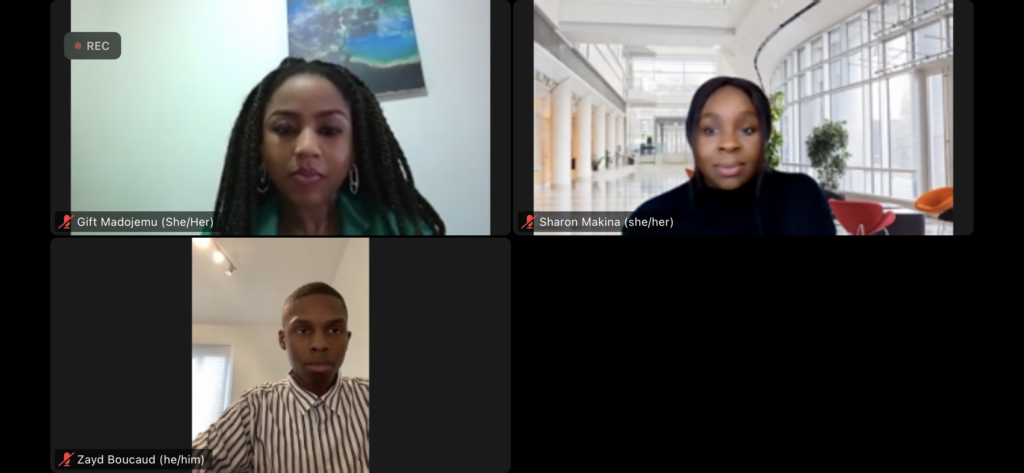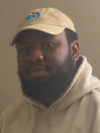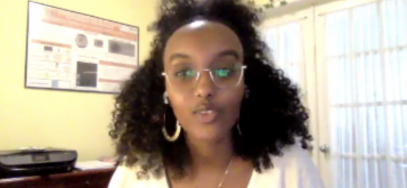by Andre Akugha
Wednesday, 26 May, 2021


The Black in STEM virtual event was held on Wednesday 26th of May, 2021 at 5pm. STEM is an acronym for: Science Technology Engineering and Math. This event was hosted by the Youth Council of the Federation of Black Canadians (FBC) who had two representatives namely; Sarah and Yasmine. Sarah and Yasmine were both leads in the communications department for FBC and they coordinated the flow of the bilingual event to cater to both English and French speakers. Panelists at the webinar were:
Toluwani Adekunle Toluwani is in his final year in Software Engineering and is also a current co-op student at the University of Alberta. He introduced himself briefly as he spoke well on his experience of how he developed his work ethic from his first year as a University student to his fourth year by adapting to school demands. Toluwani currently hopes to specialize in one of mobile app development, intelligent systems or cyber security or all of them.
Gift Madojemu Gift is a third-year medical student at University of Saskatchewan. She received her BSc. Biochemistry and Masters in Public Health from Benson Idahosa University, Nigeria and Memorial University of Newfoundland and Labrador respectively. Prior to medical school, Gift worked in Indigenous Health with Battle River Treaty 6 Health Centre, North Battleford, Saskatchewan. She is also a great advocate against human trafficking and encouraged the attendants to actively learn or research ways to help the cause.
Asli Fuad Asli is a first-year Medical Student at the University of Ottawa. Born and raised in Ottawa, she completed her 3 years of Undergrad in Health Sciences from 2017 to 2020. She is currently the Director of Internal Affairs and Finance for the Black Medical Student Association of Canada which aims to support Black Medical Students all over Canada.
Zayd Boucaud Zayd is a first-year Computer Science student at Concordia University in Montreal. He spoke briefly on his adaptation to school demands with the pandemic which started at the beginning of his first school year and how he has been planning to stay motivated.
Sharon Makina Sharon currently works for a software company as a Facilities Condition Assessments Consultant for Mechanical & Electrical Engineering Systems. She also mentioned how she had started out studying Biomed before switching to Electrical Engineering which she graduated with.
After the introductions were concluded, the format of the event followed through with questions and answers from the hosts (Sarah & Yasmine) as well as the attendants. Each question got different responses from the guest panelists which are as follows.
What does being a black person in STEM mean to you?
Toluwani Adekunle – Being black in STEM is a privilege to be able to have exposure to so much knowledge and opportunities. He went on to say that in Nigeria where he is from, it is often common to get stereotyped as a fraudster for even just having a laptop. Having such an opportunity, he plans to change the narrative sometime in the future.
Gift Madojemu – Being a black person, you instantly stand out from most of your peers. The medical field it is very competitive and you can easily get pressured because you are black, lack experience and not from Canada. Knowing you represent a lot of people looking up to you is exciting, it is a call and it is trailblazing.
Asli Fuad – You can feel small as well as a lot of pressure to not make any mistakes, but there is a sense of community between black co-workers and patients. As a result, the importance of diversity in the medical field should not be underestimated.
Zayd Boucaud – It means defying expectations of people that undermine you, as you are often isolated with not many black people present in the field.
Sharon Makina – It means hope, privilege and responsibility. It means that you can do it, no matter where you come from, despite any shortcomings you may have. Having a black person in the field to create things can be beneficial to help your community.
How has being innovative and curious helped in your development?
Toluwani responded that right from when he was young, he was always curious on how and why different devices work so well. Asking such questions has helped in his approach to problem-solving, which he has found very useful in engineering. It has also helped him gain confidence because when someone is knowledgeable about something, it can be easily explained on how it functions.
Do you ever feel pressured to be a representation for black people and how do you handle it?
Toluwani Adekunle – Communication with other black people in your community can help ease the pressure. Having someone to talk to or having personal time to think and process properly can help a lot as well.
Gift Madojemu – You cannot speak on how people think of you. As black people, we are different but most of us have shared experiences. Still, every black person is not the same and not everyone can maintain the same expectations. Although, on the positive side, it can be motivating to say black people are smart and not promote a negative stereotypes.
Asli Fuad – The minority tag placed on us black people can be taxing, and trying to educate people in the workplace can be very exhausting. To handle it, you can set boundaries and carry yourself the best way you know how.
Zayd Boucaud – Do not beat yourself up on not meeting expectations of others and only you get to dictate how your life goes.
Sharon Makina – Go where you are celebrated and not where you are tolerated. Be sure to let people know how they affect you with your boundaries and be sure to check within yourself as well.
What are your thoughts on the mental health of black people in STEM?
Gift: As black people, it is common for a lot of us to internalize a lot of things from your background and upbringing, as a lot of us are accustomed to tolerating a lot of stuff. We also have a “healthy immigrant effect” of adapting to the new culture. We tend to question a lot of things that are different from our culture and that can have an effect on us. Black people are known for having a strong mentality and having the notion not to break, but taking time to reflect, talk to loved ones or utilizing mental health resources, should not be underestimated for a healthy being. She then proceeded to mention a resource to the Black Medical Students Association of Canada (BMSCA) for mental health and mentorship purposes.
What was your support system or resources you used for support?
Toluwani Adekunle – Having to go to classes with friends and colleagues who are black was very helpful. Having to work together on projects and assignments and communicating to motivate each other also plays a huge difference. Not to forget, having family and relatives who are also in the same field or even having an older sibling in the same field to voice your thoughts and relate issues with does go a long way too.
Gift Madojemu – Having family members to support you and promote your vision. Also having a humble approach to reach out to people can be beneficial.
Asli Fuad – First and foremost communication with family and then having the right friends to work together in achieving the same goals.
Zayd Boucaud – Support from family members and having people as motivated as you or more than you can play a huge role, even though the pandemic has limited his exposure to such groups. If possible, finding routes for interaction and communication with online groups of interest can help.
Sharon Makina – Remember you are not an island. Taking time out to relax, reaching out to people and supporting your friends so that they can support you so that you are not just on the receiving end is very vital.
What would you like to see schools do to support first year students coming off their first year in university in a pandemic?
Zayd: He would like to see some accessible resources included into the program to form an engaging environment and have people reach out to each other. Sarah also mentioned the National Society of Black Engineers (NSBE) which has resources for the wellness of black engineering students.
As a Black woman, how has being in STEM affected or influenced you?
Sharon: She always had to do more and be better. Although already accustomed to that from her family of mostly men, it helped develop her competitive spirit and she had to have resilience against professors. Also against people who looked down on her; she was fortunate to have a great support system where they continuously motivate each other.
Advice for people coming into STEM?
Toluwani Adekunle – Do not let pressure or the results you get, get to you. It is not the end of the world and remember to bounce back and do it right. Results do not determine your future, only your effort and motivation determines how far you go in life.
Gift Madojemu – Do not be afraid and always try. Even if it might seem intimidating, it is better to do it than regret not putting in an effort.
Asli Fuad – If you are interested you can do it. Find communities, mentorships, social media groups and reach out to people to assist you.
Zayd Boucaud – The STEM program is broad and there are different opportunities to grow, so work hard for your goals and work to the best of your ability.
Sharon Makina – There are so many avenues to explore and do not be afraid to fail. Fail into your success and learn from your mistakes.
What resources would you recommend to newcomers transitioning into STEM?
Zayd Boucaud – Ideally, try figuring out what you want to do. It might seem nerve racking but having some form of idea does help. Also joining clubs for people with the same interests and even outside school for more resources can be beneficial.
Asli Fuad – Having study groups and making friends with people in your program. Do some research for resources because there are some that are not popular amongst social groups.
Toluwani Adekunle – Reach out to students in your field and be bold, even towards your professors. Also use textbooks and course materials from older students to put yourself ahead. A head start would cushion the pressure of school demands early on.
Gift Madojemu – Involve yourself in a program that you love and that would keep you going. If you are passionate about it then it becomes less stressful. Even activities not related to your program can help as well to take some stress off.
How would you recommend improving the Canadian school system?
Sharon Makina – The school system should implement intentional hiring so that people who are qualified; and also belong to the same group as the students, such as a teacher of color in a class of few students of color would help them not feel excluded in their classes.
Gift Madojemu – Having seminars where people can come in to educate and speak to the students and school faculty members.
As an engineer how can you get in touch with people higher up in your program?
Sharon Makina – Be comfortable with being uncomfortable. Never accept no for an answer for resources you need. If rejected, find an alternate route to achieve such and build on your social skills, so that you can network with the right people.
Toluwani Adekunle – Try to do something out of your current space. Search your school platform for available jobs and opportunities. Attend career fairs as well, as they are great for networking and collecting company merchandise and emails from people there for future opportunities.
How to deal with overcoming burnout and negative space to move forward?
Toluwani Adekunle – It is natural to feel down with stress even when you are not responsible for the end result, but again having a great support system is highly beneficial.
Gift Madojemu – Remember the reason and role you want to play in life and use that to motivate yourself.
Asli Fuad – Always give yourself patience and time to continue trying. Having a support system to motivate you not to give up is essential.
Zayd Boucaud – Have a proper mindset towards school. Take a stepback and evaluate the larger picture and other aspects you want for your life. Look for help and do not let people discourage you.
Sharon Makina – Having the right mindset to deal with issues with professors and colleagues and try to be proactive and implement conflict resolution whenever possible.
How to find different avenues or alternate career paths?
Zayd: As time goes on, you will find things you lean more towards and not just what is presented to you at the moment. He also mentioned that being adventurous can help too.
How to handle a desired change or an alternative to what you do?
Gift: The best approach is to be realistic with your current situation. Have in mind what you are sacrificing and what costs you need to make. She also stated that if you really want to do something, still apply yourself towards it.
How do you see your profession helping in the places you come from?
Toluwani Adekunle – In Nigeria, Software Engineering is a sensitive topic. If fortunate enough, he would like to change the current stigma of software developers being seen as scandalous individuals. Nigeria has multiple opportunities for growth in the tech department and he would very much like to apply himself to different projects after attaining success here in Canada.
Gift Madojemu – Psychiatric hospitals in Nigeria are currently horrible. Utilizing the courses she has taken has given her some insight on how to apply to/partner with communities back home. She also noted that when the time comes to apply yourself, it is best not to be impulsive and undermine people already working in those institutions back home but to apply the knowledge, resources and experiences gained to the hospital in a humble manner.
Asli Fuad – Hailing from both Djibouti and Somali, she mentioned that health care in both areas do face some challenges. Since she is still developing towards completing her career she is very much trying to gain more knowledge and skills to help in places back home.
Zayd Boucaud – With his major in Computer Science he would very much like to provide resources and an outlet to people to help create a physical impact and help people.
Sharon Makina – Being from Zimbabwe, she still keeps in touch with her friends and people back home that would keep her informed of things needed in the community or how to provide help.
If you could go back to the past, what would you have done differently?
Toluwani Adekunle – Putting yourself out there more. Being a minority, it is easy to feel excluded and left out so sign up for different things and apply yourself to things outside school. Also take breaks and pace yourself.
Asli Fuad – Be yourself always and set aside time for yourself.
Zayd Boucaud – Take the pressure off school responsibilities from time to time and plan out your life. Also do things that you find fun to stay happy.
Sharon Makina – Save your money and invest in yourself.
Gift Madojemu – Appreciate the journey, have fun with the process and find ways to stay happy.
After the questions and answers section came to end, the event was then concluded with attendants giving positive statements and reaffirmations towards the guest panelists and hosts for having such a wonderful event before signing off.
Andre Akugha holds a degree in software engineering from Lakehead University. He is also a creative photographer and DJ based in Ottawa. Specializes in portraits, head-shots, events, weddings, couples shots, brands, foods and products. Check out his website: https://www.andreott.com/, or Instagram page (@andreott_). Contact email: [email protected].


